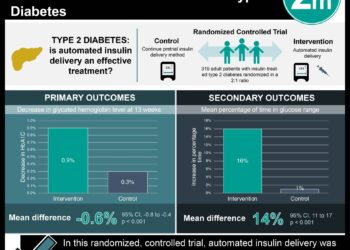Diabetes patients with high-deductible health care plans may delay seeking crucial care
1. In this study, patients with high-deductible health care plans were more likely to delay seeking care for the treatment of macrovascular complications of diabetes.
2. Patients with high-deductible health care plans, compared to those with low-deductible health care plans, were also less likely to undergo procedure-based treatments for diabetes complications.
Evidence Rating Level: 2 (Good)
Study Rundown: Diabetic patients are at high risk of macrovascular diseases, including coronary artery disease, cerebrovascular disease and peripheral vascular disease. Such conditions are highly associated with other morbidity and mortality. Many Americans have “high-deductible” health insurance policies, which involves plans that require them to pay up to $7000 out-of-pocket annually if they utilize health care services. The authors of this study aimed to evaluate whether a transition from low-deductible to high-deductible insurance is associated with delayed medical care for macrovascular diabetic complications. Generally, they found that diabetes patients with high-deductible health care plans are more likely to delay seeking care for macrovascular complications. The main limitation of the study which was acknowledged by the authors, was that adverse health outcomes were not assessed.
Click to read the study, published today in Annals of Internal Medicine
Relevant Reading: Cost-Sharing Obligations, High-Deductible Health Plan Growth, and Shopping for Health Care: Enrollees With Skin in the Game
In-Depth [observational study]: The authors conducted a longitudinal observational comparison of matched groups between Americans with low-deductible versus high-deductible insurance plans. The intervention group consisted of patients who were continuously enrolled in low-deductible insurance plans for one year, after which these patients were switched to a high-deductible plan for the next 4 years. In contrast, the control group consisted of patients who were only enrolled in low-deductible plans. The mean age of both groups was 50 years, with similar characteristics between groups. The authors observed that patients with high-deductible insurance had a delay of 1.5 months (95% CI, 0.8 to 2.3 months) for seeking care after a serious symptom of macrovascular diabetes. Further, this same group also had a delay of 3.1 months (CI, 0.5 to 5.8 months) compared to the control group with regards to accessing procedure-based treatment.
Image: PD
©2018 2 Minute Medicine, Inc. All rights reserved. No works may be reproduced without expressed written consent from 2 Minute Medicine, Inc. Inquire about licensing here. No article should be construed as medical advice and is not intended as such by the authors or by 2 Minute Medicine, Inc.







